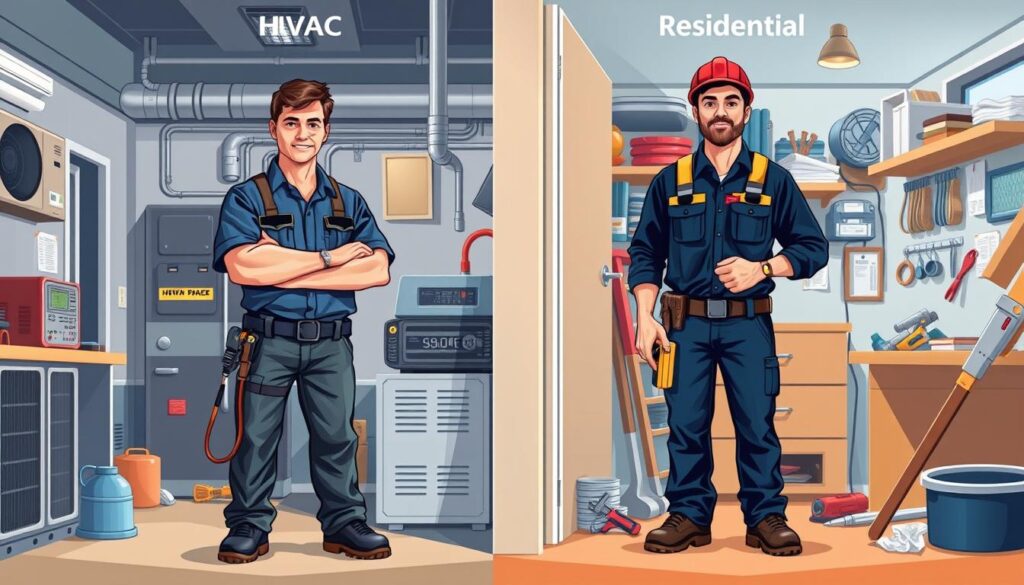Affiliate Disclosure
HVAC Guide Guys is a participant in the Amazon Services LLC Associates Program, an affiliate advertising program designed to provide a means for sites to earn advertising fees by advertising and linking to Amazon.
How Much Do You Make Working HVAC? Are you wondering how much you can make in the HVAC industry? The field of heating, ventilation, and air conditioning offers great career chances. You might be surprised by the high salary you could earn.

Payscale.com says the average salary for an HVAC technician is $54,100 a year. But, those with more experience can make a lot more. Your salary depends on where you work, your specialty, and your certifications.
The HVAC technician salary is strong and getting stronger. There’s a big need for experts who can work on complex systems. This means you have a good chance to make a lot of money in this field.
Key Takeaways
- Entry-level HVAC technicians average $54,100 annually
- Salary increases with experience and specialization
- Where you work greatly affects your pay
- Certifications can increase your earning chances
- HVAC careers offer stable and growing job prospects
Table of Contents
Understanding HVAC Career Earnings
Starting a career in HVAC can lead to great financial rewards and growth. Your earnings can change a lot based on several important factors. Knowing about hvac worker income helps you make smart career choices and plan your future.
Base Salary Ranges by Experience Level
HVAC engineer salaries grow as you gain more experience. Your income will likely go up as you get better at your job and spend more time in the field:
- Entry-Level: Typically earning around $54,100 annually
- Mid-Career: Reaching approximately $65,700 with 2-4 years of experience
- Senior Technicians: Commanding salaries near $77,200 after 4-7 years
Factors Affecting Income Growth
Your HVAC income isn’t just about how long you’ve been working. Several key things affect how much you can earn:
- Specialized Certifications can greatly increase your value in the market
- Where you live also plays a big part in how much you can earn
- Having advanced technical skills opens up more earning chances
- Your performance and reputation at work
Career Advancement Opportunities
The HVAC field has many ways to grow professionally. You can move from technician to supervisor, project manager, or even start your own business. Keeping learning and improving your skills is essential to increase your earnings and build a strong career.
Invest in your skills, and the HVAC industry will reward your expertise with substantial financial opportunities.
Average HVAC Technician Salaries Across the United States
When it comes to HVAC contractor pay, it’s all about where you are. Your salary as an HVAC installer changes a lot based on your location in the United States.
Where you work matters a lot for your salary. Some places pay a lot more than others. This means skilled HVAC workers have different chances to earn well.
| State | Average Annual Salary | Cost of Living Impact |
|---|---|---|
| California | $68,500 | High |
| New York | $65,300 | High |
| Texas | $57,800 | Medium |
| Florida | $55,200 | Medium-Low |
Several things affect how much HVAC technicians make:
- Local market demand
- Regional economic conditions
- Complexity of installation projects
- Specialized skills and certifications
Pro tip: Research local job markets to maximize your HVAC career earnings.
Explore Our HVAC Shop
Looking for top-rated HVAC tools, parts, and accessories? Visit our shop and find the perfect solution for your needs.
Visit the ShopHow Much Do You Make Working HVAC: A Complete Breakdown
Figuring out how much you can earn in HVAC is key for those thinking about this career. HVAC pay varies a lot based on experience, what you specialize in, and where you work. Let’s look at how much you might make at different stages in your career.
Entry-Level Positions: Starting Your HVAC Journey
At the start of your HVAC career, you can expect to make around $54,100 a year. New technicians get good pay while they learn important skills. Several things affect how much you earn at this level:
- Technical training completed
- Certifications obtained
- Geographic location
- Initial job market conditions
Intermediate Roles: Growing Your Expertise
As you get more experience and skills, your pay will go up. Intermediate technicians usually make about $65,700 a year. Improving your skills is key to making more money.
Senior-Level Earnings: Reaching Professional Peak
Experienced HVAC pros can earn a lot, with senior roles averaging $77,200 a year. At this level, your skills can lead to supervisory jobs, specialized consulting, or even starting your own business.
Professional growth in HVAC isn’t just about time served, but about continuous learning and skill enhancement.
Your earnings in HVAC depend on your dedication to learning and growing your technical skills.
Top-Paying States for HVAC Professionals
If you’re looking to boost your hvac maintenance salaries, some states pay more. Knowing where hvac repair technician compensation is highest can guide your career choices.
Top-paying states for HVAC pros offer great chances for skilled technicians. Let’s look at the places where your skills can pay off the most:
- California: Leading with average salaries around $59,200
- New Jersey: Offers competitive pay at $58,300
- Washington: Provides attractive pay at $58,000
- Massachusetts: Offers solid earnings of $57,500
- New York: Presents opportunities at $56,900
These states are notable for several reasons that affect HVAC professional earnings:
- Higher cost of living leads to higher wages
- Strong construction and infrastructure projects
- Tougher licensing and certification rules
- More demand for specialized HVAC services
Thinking about moving or advancing in your career? These states are great for HVAC technicians. Your skills could lead to much higher earnings than the national average.
“Location can be a game-changer in your HVAC career trajectory” – HVAC Industry Experts
Before moving or advancing, research your target state’s needs, local market, and special opportunities. This will help you make the most of your hvac maintenance salaries and career growth.
Explore Our HVAC Shop
Looking for top-rated HVAC tools, parts, and accessories? Visit our shop and find the perfect solution for your needs.
Visit the ShopGeographic Salary Variations and Cost of Living Impact
Your salary as an HVAC technician can change a lot based on where you work. The place you work in greatly affects how much you earn. Many things, like the cost of living and job demand, play a part in this.
Urban vs Rural Pay Differences
HVAC workers in cities usually make more money than those in rural areas. Places like San Francisco, New York, and Chicago offer better pay.
- Urban areas provide 15-25% higher base salaries
- Larger cities have more complex HVAC infrastructure
- Greater demand for specialized technical skills
Regional Market Demands
Each region has its own market needs that affect HVAC technician salaries. Places with harsh weather or fast growth need skilled HVAC workers.
- Southwestern states demand cooling specialists
- Northern regions need heating system experts
- Coastal areas require corrosion-resistant installation skills
Living Cost Adjustments
When thinking about your salary, remember to consider local costs of living. A high salary in a pricey city might not go as far as a lower salary in a cheaper area.
Your real compensation isn’t just about the number on your paycheck—it’s about what that money can actually purchase in your specific location.
Explore Our HVAC Shop
Looking for top-rated HVAC tools, parts, and accessories? Visit our shop and find the perfect solution for your needs.
Visit the ShopExperience Levels and Corresponding Pay Scales

Knowing how your income grows with experience is key in the HVAC field. As you get better at your job, you can earn more.
Payscale.com shows HVAC techs see big salary increases as they grow. Starting out, you might earn less. But, learning new skills can really boost your pay.
- Entry-Level (0-2 years): Learning fundamental skills
- Intermediate (2-4 years): Significant income growth
- Experienced (5-10 years): Specialized expertise
- Senior-Level (10+ years): Peak earning
Your income path depends on a few important things:
| Experience Level | Average Annual Salary | Skill Development Focus |
|---|---|---|
| Entry-Level | $35,000 – $45,000 | Basic technical skills |
| Intermediate | $45,000 – $65,000 | Advanced system knowledge |
| Experienced | $65,000 – $80,000 | Specialized certifications |
| Senior-Level | $80,000 – $100,000 | Leadership and complex problem-solving |
Keep learning and improving your skills to increase your income. Invest in your career, get advanced certifications, and keep up with new tech. This will help you earn more.
Maximizing Your HVAC Income
Getting ahead in the HVAC world is not just about knowing your stuff. It’s also about knowing how to make more money. HVAC pros who know how to boost their pay and wages do it with smart strategies.
Certification Benefits
Getting certified can really up your earning game. HVAC techs who get special certifications often see their pay go up a lot.
- EPA Section 608 Certification
- NATE (North American Technician Excellence) Certification
- HVAC Excellence Professional Level Certification
Specialization Opportunities
Being an expert in a specific area can make you more valuable. Think about focusing on areas that pay more.
- Commercial HVAC systems
- Green energy technologies
- Industrial refrigeration
- Smart home climate control systems
Performance Bonuses
Many HVAC companies pay based on how well you do. If you’re really good and serve your customers well, you can make a lot more money.
Top HVAC pros can make up to 30% more each year with bonuses and commissions.
By getting certified, specializing, and working hard, you can turn your HVAC job into a high-paying career. It’s all about the right strategies and skills.
Explore Our HVAC Shop
Looking for top-rated HVAC tools, parts, and accessories? Visit our shop and find the perfect solution for your needs.
Visit the ShopCommercial vs Residential HVAC Compensation

Looking into hvac service pay rates shows big differences between commercial and residential HVAC. Commercial HVAC techs usually make more money. This is because of the complex industrial systems and the special skills needed.
Your pay can change a lot between these two areas. Commercial HVAC maintenance salaries are often much higher than those for residential work. The main reasons are:
- System Complexity: Commercial systems need advanced technical knowledge
- Certification Requirements: More specialized credentials for industrial work
- Project Scale: Larger installations mean potentially higher compensation
Residential HVAC techs often start with lower wages but can earn steady income from local demand. Commercial techs might earn 20-30% more. This is because of the complex equipment and the high-stakes environments.
“The complexity of your work directly influences your earning in HVAC,” says industry expert Mark Thompson.
Your career path greatly affects your income. Choosing to specialize in commercial HVAC systems means more challenging work. But it also means higher pay. Think about your technical skills, career goals, and local market opportunities when deciding your path.
Additional Income Streams for HVAC Professionals
Being an HVAC repair technician means you can earn more than just your hourly wage. Smart workers look for extra ways to make money. This helps them earn more and stay financially stable.
Here are some ways to boost your earnings:
- Overtime Work: Weekend and after-hours service calls often pay premium rates
- Commission-Based Sales: Selling system replacements and upgrades
- Maintenance Contracts: Recurring revenue from preventative service agreements
- Specialization Services: Energy auditing and smart home technology installations
Top HVAC pros can make 20-40% more each year by using these methods. Learning about new tech like smart homes and energy-saving systems can lead to big payoffs.
Think about these advanced ways to make more money:
- Develop partnerships with local real estate agencies
- Offer consulting services for commercial HVAC system design
- Create online training content or tutorials
- Provide expert witness testimony for HVAC-related legal cases
By expanding your skills and looking for new ways to earn, you can turn your HVAC job into a thriving career. It becomes more than just a job; it’s a chance to grow and succeed financially.
Explore Our HVAC Shop
Looking for top-rated HVAC tools, parts, and accessories? Visit our shop and find the perfect solution for your needs.
Visit the ShopTraining and Certification Impact on Earnings
Boosting your hvac technician salary isn’t just about years of experience. Investing in training and certifications can greatly increase your earnings. Smart professionals upgrade their skills to earn more.
Certifications are key to moving up in the HVAC field. The North American Technician Excellence (NATE) certification is a game-changer. It can quickly raise your income.
- NATE Certification: Typically increases salary by 5-10%
- EPA Section 608 Certification: Mandatory for handling refrigerants
- Specialized Technical Certifications: Can boost earnings up to 15%
“Continuous learning is the minimum requirement for success in the HVAC industry.” – HVAC Industry Expert
Employers look for technicians who keep learning. By getting more training, you show you’re dedicated and skilled. This can lead to:
- Higher starting wages
- Faster promotion opportunities
- Access to more complex and lucrative projects
Pro Tip: Consider employer-sponsored training programs that can provide certifications at minimal or no cost to you.
The benefits of professional certifications are huge. While training costs might seem high, the long-term gains are worth it.
Conclusion
The HVAC industry is full of opportunities for those looking for stable and well-paying jobs. HVAC worker income is on the rise, with chances for growth in different areas and levels of experience. The Bureau of Labor Statistics says there will be a 5% increase in demand each year.
Your earnings as an HVAC engineer can increase with the right career moves. Keep learning, get advanced certifications, and find your niche. Cities and areas with lots of construction offer the best pay for skilled HVAC workers.
To make more money, be flexible and keep improving your skills. Whether you work on homes or buildings, knowing the market and staying up-to-date with technology is key. With jobs growing and new tech coming in, your career and earnings can soar.
As you move forward in your HVAC career, remember that growing professionally means more money. Keep up with industry news, get specialized training, and be ready for new tech. Your hard work can turn a technical skill into a fulfilling career with great pay.

